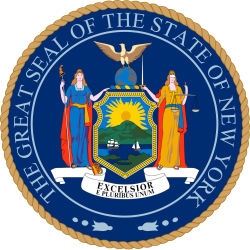Town clerks
Two town clerks, one in Barker and another in Granby, resigned their positions due to moral and religious objections to signing marriage certificates for same-sex couples. [66] For the same reason, a clerk in Guilderland announced she would continue in her position but would no longer officiate at any weddings, allowing another official to do so in her stead. [67] The town clerk of Volney said she will not sign marriage certificates for same-sex couples unless forced to do so. [68] Kathleen Rice, the district attorney for Nassau County, warned all town clerks within her jurisdiction they could face criminal charges if any refused to perform their duties with respect to same-sex marriages. [69] The town clerk of Ledyard, Rose Marie Belforti, made state and national headlines when she notified town officials that she would not sign gay marriage certificates due to her religious beliefs. Belforti later delegated marriage applications to a deputy. Same-sex marriage advocates and some town residents criticized Belforti for taking this action, and resident Ed Easter attempted to unseat her in the fall of 2011. Belforti was reelected by a substantial margin. [70] Governor Cuomo took the position that municipal employees responsible for solemnizing or licensing marriages were obliged to solemnize or license same-sex marriage licenses as well. "If you can't enforce the law, then you shouldn't be in that position," Cuomo said. [71] New Yorkers for Constitutional Freedoms set up a "Courage Fund" to "assist courageous municipal clerks and other people of conscience in New York State who oppose same-sex 'marriage' from harassment, denial of rightful promotion, or unfair termination for invoking New York State law protecting their sincerely-held religious beliefs". [72]
Ensuing elections and appointments
Four Republican state senators−Sens. James Alesi, Mark Grisanti, Roy McDonald, and Stephen Saland−voted in favor of same-sex marriage in 2011. Following their votes, the four senators received public support from New York City Mayor Michael Bloomberg, who scheduled a fundraiser for the four senators that was expected to raise $1.25 million. [75] [76] Mayor Bloomberg also made maximum contributions to each of their re-election campaigns. [75]
On May 9, 2012, Alesi announced that he would not run for re-election. He stated that many factors, including the welfare of the Republican Party, led to his decision. [77] Prior to Alesi's announcement, Assemblyman Sean Hanna had expressed interest in challenging Alesi in the Republican primary. [78] Alesi indicated that his same-sex marriage vote would have "severely hampered" his chances in a Republican primary. [79]
Grisanti, McDonald, and Saland each faced primary challenges in 2012. Grisanti defeated attorney Kevin Stocker, 59% to 40%, [80] after a campaign in which "much of the bitterest politicking had revolved around Grisanti's controversial 2011 vote to support legalizing same-sex marriage in the state." [81] In the general election, Grisanti defeated three other candidates, including a Conservative Party challenger who opposed same-sex marriage. [82]
In the District 43 Republican primary, McDonald faced Saratoga County Clerk Kathleen Marchione, who criticized McDonald's vote for same-sex marriage. [83] After a primary contest that was described as "divisive", [84] "bitter," [85] and "nasty", [86] Marchione declared victory by a narrow margin on September 25, 2012. [84] McDonald later opted to cease his campaign and support Marchione. [87] Marchione won the general election on November 6, 2012. [88] Following McDonald's loss, a Newsday headline described the senator as "a political casualty of same-sex marriage." [89]
In District 41, Saland received a Republican primary challenge from Neil Di Carlo. [90] Saland won by a margin of 107 votes. [91] [92] Di Carlo continued his campaign as the candidate of the Conservative Party, and Saland lost the general election to Democrat Terry Gipson [93] by a margin of 2,096 votes. [94] Di Carlo acted as a spoiler, [93] receiving 17,300 votes on the Conservative line. [94]
Of the four Republican state senators who voted in favor of the Marriage Equality Act, only one—Mark Grisanti—was re-elected to the State Senate in 2012. [95] Grisanti was defeated in the 2014 elections. [96]
In 2013, Gov. Andrew Cuomo appointed Alesi to a $90,000-per-year post [97] on the Unemployment Insurance Appeal Board. [98]
In 2015, Gov. Cuomo appointed Grisanti to the New York State Court of Claims. Grisanti's appointment was confirmed by the New York State Senate in May 2015. [99] The reported salary for the judgeship was $174,000. [100]
In 2016, Gov. Cuomo appointed Saland to the board of the state Thruway Authority. [101]
In June 2017, Gov. Cuomo nominated Alesi to a $109,800-per-year [102] position on the state's Public Service Commission; the Senate confirmed his appointment. [103]
Lawsuits
Sen. Rubén Díaz Sr., a Democrat and the most prominent opponent of the Act, announced at a rally on July 24, 2011 that he would file a lawsuit alleging that the same-sex marriages performed on that day were illegal. Diaz said the lawsuit would challenge judicial waivers that allowed a same-sex couple to marry on the same day they applied for a marriage license. [104]
On July 25, 2011, New Yorkers for Constitutional Freedoms, along with Liberty Counsel, filed a lawsuit in the New York Supreme Court for Livingston County against the New York Senate and other state offices seeking an injunction against the Act. [105] [106] On November 18, 2011, Acting Supreme Court Justice Robert B. Wiggins allowed the plaintiffs' claims under the Open Meetings Law, but dismissed other portions of the case. He noted: "It is ironic that much of the state's brief passionately spews sanctimonious verbiage on the separation of powers in the governmental branches, and clear arm-twisting by the Executive on the Legislative permeates this entire process." [107] On July 6, 2012, a five-judge panel of the Appellate Division ruled unanimously that no violation of the Open Meetings Law had occurred and dismissed the suit. [108] On August 6, 2012, Liberty Counsel appealed to the New York Court of Appeals, [109] which declined to hear the appeal on October 23. [110]


